Tag archives: policy
Giving scientific advice in Japan
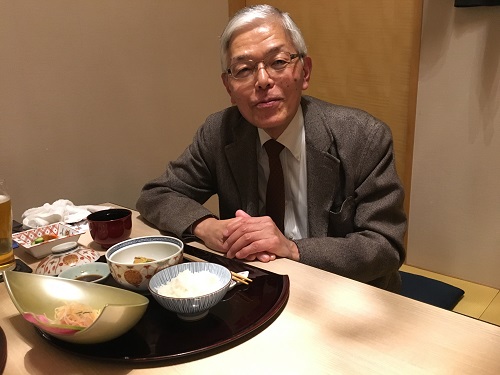
Sound advice: Tateo Arimoto
By Michael Banks in Tokyo, Japan
US President Donald Trump might be in Japan right now eating hamburgers and playing golf with the recently re-elected prime minister Shinzo Abe, but his presence didn’t stop me and Physics World editor Matin Durrani having our own high-level meeting as we began our week-long tour of the country.
After landing at Haneda airport in Tokyo, we headed straight to our downtown hotel for a meeting with Tateo Arimoto, who is director of science, technology and innovation at the National Graduate Institute for Policy Studies and a principal fellow of the Japan Science and Technology Agency (JST).
Over a light dinner of sushi, rice and vegetables, we had a wide-ranging and frank discussion about the role of scientific advice in Japan.
View all posts by this author | View this author's profile
3D neutrinos on your phone, Hamiltonian: an Irish Musical, is a March for Science a good idea?
By Hamish Johnston
How would you like to explore a giant neutrino detector in 3D from the comfort of your mobile phone? VENu is a new smartphone app that allows you explore the physics underlying the MicroBooNE neutrino detector at Fermilab. Developed by Alistair McLean of New Mexico State University and an international team of physicists, the app is used in conjunction with the Google Cardboard headset to provide users with a virtual-reality experience of MicroBooNE. VENu includes games that offer “brain teasing challenges” including working out how to spot a neutrino event in a busy background of cosmic-ray events. The app can be downloaded free of charge from the Apple Store and the Google Android Marketplace.
View all posts by this author | View this author's profile
Boosting innovation in a Brexit Britain
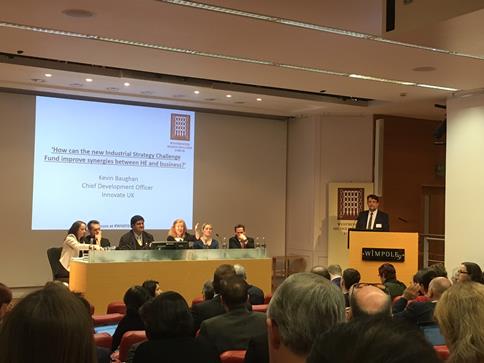
Kevin Baughan, chief development officer at Innovate UK, addressing delegates at a Westminster Higher Education Forum yesterday on UK science funding and policy.
By Michael Banks
I headed to London yesterday for an event on the future of UK science and innovation funding and policy that was organized by the Westminster Higher Education Forum.
Held at the Royal Society of Medicine, the meeting was attended by representatives from government, business and academia. It was impeccably timed given that the “Brexit bill” is currently going through parliament and the UK government recently published an industrial strategy together with the announcement of an additional £4.7bn for R&D.
While it is safe to say that the UK is a scientific powerhouse, the same cannot be said of its ability to translate research into products and services, something that the new industrial strategy aims to tackle.
View all posts by this author | View this author's profile
US immigration and trade policies provoke debate at Photonics West
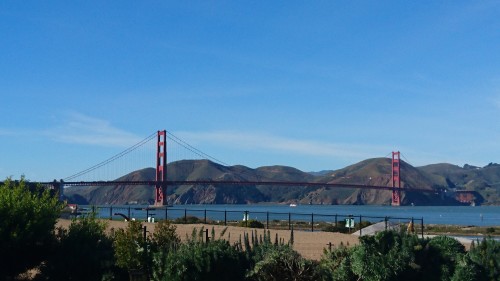
San Francisco’s Golden Gate Bridge welcomes scientific visitors to Photonics West – except for those banned from travelling to the US.
By Margaret Harris at Photonics West in San Francisco
“I’m an immigrant. I stole one American job. I helped create hundreds of thousands of others.”
Deepak Kamra’s words caused a stir among listeners at Photonics West, the massive industry trade show and scientific conference that descends on San Francisco, California each winter. Speaking at a panel discussion on “Brexit, US Policy, EU and China,” the Delhi-born veteran of the Silicon Valley venture capital scene said that he expected the new US administration – which recently imposed a travel ban on visitors from seven majority-Muslim countries – to target Asian and South Asian technology workers next. Restrictions on the number of foreign-born students studying science, technology, engineering or mathematics (STEM) at US universities could follow. Ultimately, Kamra concluded, “We are going to lose a lot of qualified people.”
View all posts by this author | View this author's profile
Finding innovation in space
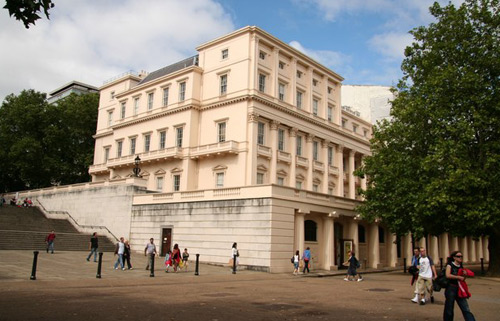
Way to go: Carlton House Terrace. (CC BY-SA 2.0 Richard Croft)
By Margaret Harris
I have a mental block about Carlton House Terrace. This elegant little street in central London is home to several of the UK’s national academies, including the Royal Society and the Royal Academy of Engineering (RAEng), and I’m sure I’ve visited it at least half a dozen times. Yet somehow, whenever I emerge from Charing Cross underground station in the middle of Trafalgar Square, I never know which way to go next.
Fortunately, this is the 21st century, so when the usual disorientation struck me yesterday on my way to an “Innovation in Space” event at the RAEng, I simply pulled out my smartphone. Within seconds, an app told me exactly where I was (plus or minus a few metres) and how to walk from there to 3 Carlton House Terrace. Minutes later, I was safely ensconced in the seminar room, nodding in agreement as the event’s chair, Sir Martin Sweeting, explained how space-related innovations – including, ahem, the network of satellites that make up the Global Positioning System (GPS) – have become an integral part of our daily lives.
View all posts by this author | View this author's profile
More data needed on the STEM ‘shortage’

(Courtesy: iStock/geopaul)
By Margaret Harris
“Science has always been the Cinderella amongst the subjects taught in schools…not for the first time our educational conscience has been stung by the thought that we are as a nation neglecting science.”
Sounds like something David Cameron or Barack Obama might have said last week, right? Wrong. In fact, it comes from a report by the grandly named Committee to Enquire into the Position of Natural Sciences in the Educational System of Great Britain, which presented its findings clear back in…1918.
I came across this quotation thanks to Emma Smith and Patrick White, a pair of education researchers at the University of Leicester who have spent the past few years studying the long-term career paths of people with degrees in science, technology, engineering and mathematics (STEM). Smith and White presented the preliminary findings of their study at a seminar in Leicester yesterday, and one of the themes of their presentation – reflected in the above quote – was the longevity of concerns about a shortage of STEM-trained people, especially university graduates. As Smith pointed out, worries about the number and quality of STEM graduates are not new and, historically, reports of a “STEM crisis” have been as much about politics as they have economic supply and demand.
View all posts by this author | View this author's profile
Muzzling scientists leads to mistrust of government says physicist MP
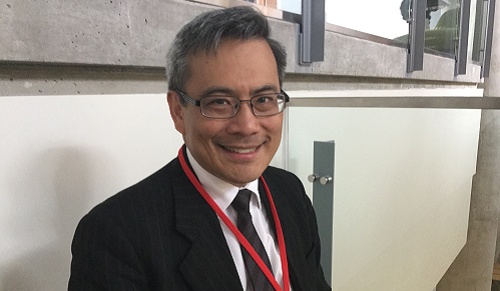
Canadian MP Ted Hsu believes in free speech for government scientists.
By Hamish Johnston at the CAP Congress in Edmonton, Canada
Yesterday I caught up with Ted Hsu, who is member of the Canadian parliament for Kingston and the Islands – and a former physicist. Hsu is a member of the Liberal party, which means he sits on the opposition benches. There he has been an outspoken critic of the current Conservative government over its apparent “muzzling” of scientists on the federal payroll. He believes that when governments seek to silence their experts it leads to more public mistrust of government.
View all posts by this author | View this author's profile
Debating UK science

Science and the ballot box. (Courtesy: iStockphoto/stocksnshares)
By Michael Banks
Yesterday evening I went to the Royal Society in London to hear what the three main political parties in the UK have to say about science. The event was held because in May voters in the UK will be heading to the polls to choose their next government. The three parties had therefore sent their main science representatives to the Royal Society to spell out their intentions.
Chairing the debate was space scientist Maggie Aderin-Pocock of University College, London. She had the unenviable task of keeping science minister Greg Clarke (Conservative), Liberal Democrat science spokesperson Julian Huppert, and shadow universities, science and skills minister Liam Byrne (Labour) in check. For non-UK readers, it’s worth pointing out that the Conservatives have been in coalition with the Liberal Democrats since 2010.
View all posts by this author | View this author's profile
The cure is success
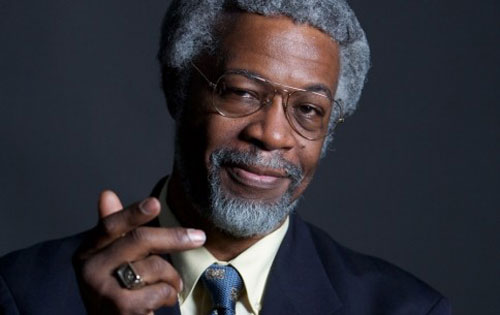
Jim Gates. (Courtesy: John T Consoli, Cheltenham Science Festival)
By Margaret Harris
Last Sunday I went up to Cheltenham for the final day of the town’s annual Science Festival. My plan was to meet the University of Maryland theorist Jim Gates before lunch and then stay to hear his lecture on science and policy.
I was already somewhat familiar with Gates’ research thanks to a feature he wrote for Physics World in June 2010. I could also have made an educated guess about his activities as a member of the President’s Council of Advisers on Science and Technology (PCAST). However, I knew very little about his personal history before his evening lecture, when he was interviewed by the physicist and science presenter Jim Al-Khalili.
Gates was born in 1950 and grew up during a period when African-Americans faced severe institutionalized discrimination across the US. However, being from a military family helped insulate him from some of the worst effects, and he told the audience that he didn’t feel the full impact until his family moved to Florida after he turned 11. For the first time, he attended a racially segregated school, and there, he said, he had “the very curious experience of having to learn how to be black”.
A day in the life of an astronaut, Hawking’s football conclusions, politics and science and more

“Good morning world” (Courtesy: Tim Dodd)
By Tushna Commissariat
For most of us, the life of an astronaut is one of excitement and adventure. Indeed, the mere thought of being a “real live astronaut” brings out the gleeful inner child in many, and photographer Tim Dodd is much the same. After purchasing a Russian high-altitude space suit from an online auction website, Dodd put together a series of photographs titled “A day in the life of Everyday Astronaut”, my favourite of which you can see above. Do take a look at the rest of the excellent series on Dodd’s website and follow him on Instagram for even more of the same.
View all posts by this author | View this author's profile